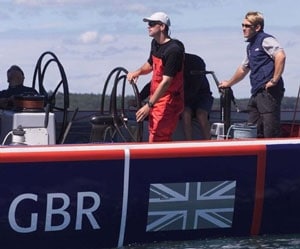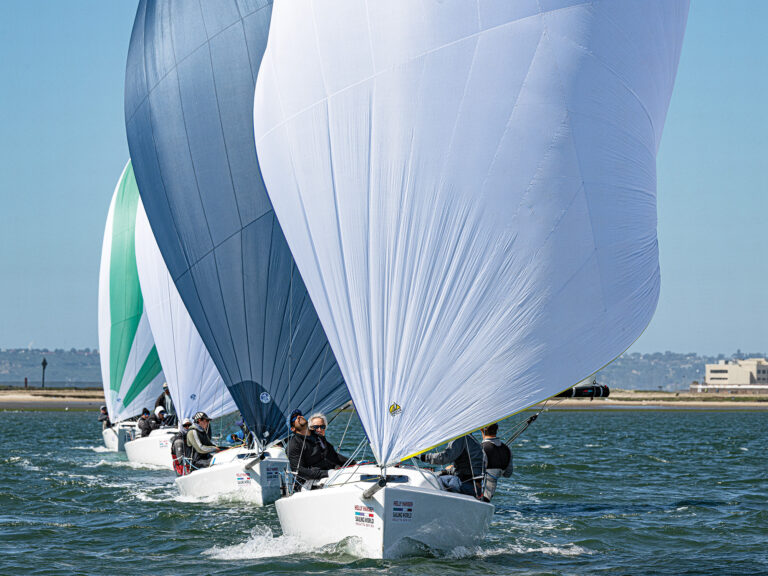
Slightly built, unassuming, and balding at 31, Ian Walker was easy to miss at the 2002 London Boat Show in January; most of the 150,000 people who attended failed to recognize him. But it wasnt for lack of effort on the part of the Cambridge graduate. Walker diligently worked GBR Challenges booth on the ground floor of the expansive Earls Court Convention Center, pressing flesh, and trying, often in vain, to snag the publics attention as it rushed past, intent on getting a glimpse of Englands most famous sailor, Ellen MacArthur. No one would blame Walker if he was more than a little put off. After all, he was winning Olympic medals and world championships when Ellen–the first name suffices across the pond–was a just precocious teenager with oversized dreams. But when Walker signed on with the first British Americas Cup challenge in 15 years, he was well aware of the uphill battle he would face–both at home and in Auckland.
This campaign was launched with modest expectations. Has that changed?
Its the hardest question to answer, and its the question that everybody asks, “How do you think youre going to do?” You cant say, “Were not going to win,” because nobody wants to enter thinking they dont have a chance. But history suggests that its a tough event. Every time we make progress and achieve our goals within our team, we feel more comfortable that well be competitive.
This isnt the first time youve come in late in the game. You spent 18 months sailing the Star and won a silver. How do you make up for lost time?
Im hard on myself and I set high standards; Im never happy unless I achieve those standards. I suspect within the Americas Cup we may be slightly naive in the standards we hope to get to. But, a bit of naiveté might help us because we dont know what the expected level is. Im a fighter, a battler, and I normally get better results when I have a bad start.
You won two Olympic silver medals, one on the wire, one at the helm. Were they equally as satisfying?
I think they were similar. In many ways, the Star was the greater achievement, but the 470 silver was the first medal Id won. So they were both great achievements in their own right. As for the helming/crewing thing, I dont think it matters. Whats key is that youre working together and achieving things as a pair.
You won your first crewing for John Merricks, who died in a car crash in 1997. Describe your transformation from 470 crew to Star helmsman.
John and I were good friends. We sailed against each other for years. Maybe thats why we respected each other so much, because we spent so much time beating each other up. We were young. We liked to party, but at the same time we liked to do well racing. When Glyn Charles passed away in the 1998 Sydney-Hobart Race–hed sailed with Mark Covell in the Star in Atlanta–I got to know Mark quite well because I was helping him through that. Thats one thing that was different in Sydney–there was a lot of emotional attachment to our success. We always said that we werent doing it for them–ultimately you have to do it for each other and for yourselves. But Mark and I wouldnt have ended up sailing together had it not been for two tragic accidents. So I guess that meant that much more to us that we could put that performance in and do it in their memory.
You mentioned having a lot of fun with John. Was your Star campaign more serious?
I guess you do grow up a bit. I think that in the 470 we had such a big edge over people we could afford to go a little wild and still get the results we needed. In the Star, I was always playing catch up. Also, we both had more commitments; Mark had a young child, Id just gotten married. We worked hard at it, but we still had good fun; we still had our moments.
Your Americas Cup team is almost exclusively British, a rarity in this age of rampant free agency. Is that important?
Im very patriotic–I should be careful what I say so I dont talk myself out of a job–and I would find it hard to go the extra mile if I wasnt doing it with my friends and for my country. But its a professional world, and I do respect the people sailing for other countries. I do think it goes against the spirit of the Americas Cup; but its not something I lose a lot of sleep over. At the end of the day, its a tremendous competition and thats what I thrive on. Whether its a game of squash or tennis or anything else, I hate losing.









